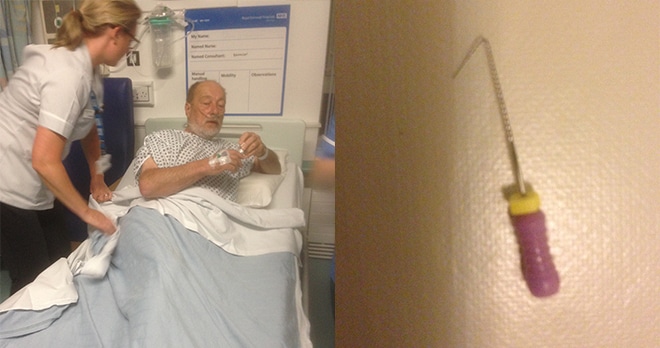Grandfather brings dental negligence claim with the help of RWK Goodman after dentist drops metal file down his throat

Pensioner Alexander Hoar, aged 74, is bringing a claim for compensation against a dentist who worked at Oasis Dental Care in Penzance with the help of the dental negligence team at law firm RWK Goodman.
Mr Hoar, who is married and has three sons and two grandchildren, went to see his dentist for root canal surgery.
“Everything was fine in the preparation to surgery,” he said. “I was feeling relatively relaxed even after she had drilled down into the tooth.”
The former building surveyor was sitting in the dentist’s chair with his head back and mouth wide open waiting for the next part of the surgery to take place when he “spotted something dangling above my head”.
He later learned that object was a root canal file, a thin piece of metal about an inch long with a serrated edge and attached to a plastic handle.
“A split second later it dropped down into my mouth and straight to the back of my throat,” said Mr Hoar, adding: “then all hell broke loose.”
He described how, clutching at his own throat, he began gagging whilst the dentist tried unsuccessfully to pluck the file back out.
“I had no idea at that stage what had happened or what was going on,” he continued. “No one seemed to know what to do, I was terrified.”
His panic eased slightly when he realised he could breathe, but was still in extreme discomfort feeling the file lodged firmly in his throat.
I kept trying to cough but it wouldn’t move, and I was scared to swallow in case I pushed it further down my throat and into my stomach.”
After explaining to their patient what had happened, the dental staff contacted the West Cornwall Hospital, then asked Mr Hoar if he could make his own way there.
“I was shocked they didn’t even think it was serious enough to call me an ambulance,” he said.
“To make matters worse, they said I had to make arrangements to find my own way to the hospital – they didn’t even see fit to escort me out of the building.”
Thankfully one of Mr Hoar’s sons wasn’t too far away and was able to collect his father and drive him to the hospital. On arrival at the West Cornwall Hospital he was refused an ambulance and after several hours and a trip to yet another hospital, he was finally seen by a consultant.
But, by then, the file had moved down his throat and into his stomach where it caused a small tear which doctors had to repair during endoscopic surgery.
Mr Hoar said: “I had to have a camera on the end of a pipe pushed up my nose and down my throat, which he had to endure three times After they removed the file back out through my mouth they put a clip over the tear in my stomach.
“I’ve since been told the file could have caused a lot more damage to my stomach than it did, so for that I’m grateful.”
He finally returned home in the late afternoon after staying overnight in hospital recovering. Mr Hoar described the whole ordeal as “completely traumatising” and “one of the worst experiences of my life”.
He continued: “You know when a dog goes all submissive and rolls on its back and just accepts its fate? That’s just how I felt during this.”
He added: “No one should have to go through what I endured, but particularly a person at my stage in life, I feel like I was treated disgustingly.”
The dental negligence team at RWK Goodman, which is helping Mr Hoar to bring his claim, said it was time for the dental industry to produce a list of ‘never events’, much in the same vein as the list of ‘never events’ NHS England produces for hospital settings.
Ben Lees, a solicitor at RWK Goodman who advises clients on dental and medical negligence claims, said: “What we have here is a dreadful situation where an older man has turned up for what should be a routine piece of dentistry and has instead found himself in an emergency situation.
“Allowing a metal file to fall into a patient’s mouth is not only completely unacceptable, it is also completely avoidable. All dentists should use what is known as a rubber dam to isolate the teeth and prevent tools or debris from falling down the patient’s throat.”
Ben Lees continued: “NHS England collects data on what it refers to as ‘never events’, essentially a list of potential scenarios that are totally avoidable and should therefore never be allowed to happen, which is a sensible policy. We are seeing an increasing number of cases like this which, in our view, points to the fact that the dental world should now adopt its own ‘never events’ list, outlining events that should not be allowed to happen to their patients under any circumstances.”